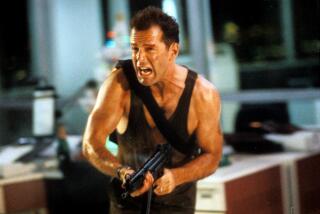WELLES: THE VERY VOICE OF GENIUS
- Share via
The deaths within hours of Orson Welles and Yul Brynner are a reminder, sad but struck with vivid recollections, of what extraordinarily diverse and enchanting talents the motion pictures have attracted over their tumultuous decades: Brynner the Gypsy acrobat who brought a touch of exoticism to a variety of roles, made the shaved head heroically sexy and found a 30-year career within a career being the king of Siam; Welles the maverick genius whose protean like the radio, stage and screen had never seen before and in all probability never will again.
That voice was one of the splendid musical instruments of our time, and his appearances, often villainous, always committing scene-larceny on whomever else was visible on the screen, have made him an indelible memory to those who may or may not know or care about the films he made.
Two brand-new full-scale biographies, one by Charles Higham, one by Barbara Leaming--in themselves an acknowledgement of Welles’ unparalleled hold on the public imagination--have made clear what an arts-drenched and uncommon upbringing Welles had had. Given the facts, it was clear he was going to have to sink or swim, in circumstances in which only a genius could have swum. He swam, and with a self-confident and well-informed freedom from inhibition, doubts, timidities and other perils of youth and beyond; he was creating art and making powerful impressions before he found it necessary to shave.
His first time out, not yet 26, he made what is still assuredly one of the 10 finest films ever done in any country in any tongue--a blending of technical innovation, economic shrewdness and human feeling that thrills as style and touches as content even on the 15th or 30th viewing--and which remains an inspiration to would-be film makers everywhere.
(William Friedkin recalled years ago that with his first paycheck as a television floor manager in Chicago he bought his own print of “Citizen Kane” and ran it through a viewer frame by frame, again and again, 80 times.)
Whether “Kane” owed its strength equally to Welles and author Herman Mankiewicz or all to Welles or more to Mankiewicz is still debated and is the subject of yet another new book, “The Making of Citizen Kane,” by an Illinois professor, Robert Carrington.
Welles had riled the town’s professionals by comparing film making to a lovely electric train and saying you could learn what you needed to know over a weekend. What he had in fact learned in his Mercury Theater days was to be in charge but to surround yourself with the best collaborators you could find.
There is, of course, an inevitable sense of incompletion about Welles’ creative life; it is the cliche view of him. It is true that he was a maverick who made Hollywood uncomfortable, but he had insisted again and again that he brought his films in on time and on budget no matter what his reputation was.
Yet despite the undeniable triumphs of “Citizen Kane” and “The Magnificent Ambersons” (even with an ending applied by someone else) and the cinematic excitements of “The Lady From Shanghai” and “Touch of Evil”--the visual excitements of everything he touched, in fact--he was never able to endear himself to Hollywood, whose loss it was.
At that, the real irony may be that he was at heart Hollywood’s kind of creator, philosophically as well as literally a magician, who saw himself as a conjurer and an entertainer, a diversionist, rather than as a film maker with a mission to inform or re-form the world.
If he had a sense of evil, it was of evil as more interesting than good, and of villains who had all the best lines and scenes. The lasting quality of “Kane,” its human dimension, the loveless reality of Charles Foster Kane’s life, was to a degree present in “Ambersons.” Then the conjurer took over, with usually dazzling results that less frequently seemed to have something to say beyond their dazzle.
His last, unfinished film, “The Other Side of the Wind,” looked to be, in the 20 or so minutes of it that Welles screened one evening a few years ago, Welles at his ingenious economical best. A tense scene in a VW on a rainy night was achieved with a garden hose, stagehands rocking the vehicle and others running past with lights. It is also a look--not necessarily autobiographical but personal in its commentary--on the world of mostly Hollywood film making.
It may not be the finest hour of Welles’ legacy--”Kane” is that, now and forever--but if the world gets to see the rest of it, it will probably be a sharp and reproving message to Hollywood that Welles was, with D. W. Griffith, Charlie Chaplin, John Ford and a finger-count of others, one of the irreplaceable originals who explored and extended the range of the movies.
More to Read
Only good movies
Get the Indie Focus newsletter, Mark Olsen's weekly guide to the world of cinema.
You may occasionally receive promotional content from the Los Angeles Times.









